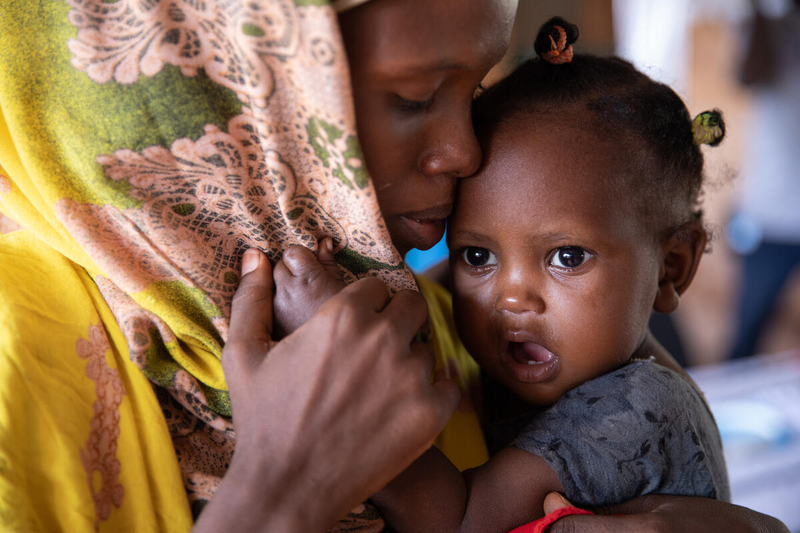Geneva/New York, September 6 – Humanitarian organizations are jointly urging donors to step up life-saving assistance in Somalia, saying that the window of opportunity to prevent famine is closing in the country which saw over 250,000 people, at least half of them children, died during the last famine in 2011.
A group of 20 Principals of the Inter-Agency Standing Committee, from the World Food Program and World Health Organization to Save the Children United States and CARE International, issued a warning that famine is unfolding in Baidoa and Burhakaba districts in the Bay region in South-Central Somalia, and will likely last until March 2023 “if humanitarian aid is not significantly and immediately scaled up.”
“Starvation and death are likely already occurring,” said the warning.
“Somalia has reached a tipping point,” it said. “The lives of hundreds of thousands of people are at immediate risk, according to the latest food security and nutrition analysis. Millions more face extreme levels of acute hunger. Women, particularly pregnant and lactating women, and children under the age of five are among the most vulnerable. They require urgent assistance to avert a worst-case scenario.
“In total, across the Horn of Africa, 20.5 million people are facing a dire and entirely avoidable hunger crisis. This is unacceptable.”
“We appeal to donors to provide immediate, flexible funding to enable humanitarian agencies on the ground, particularly local and international NGOs, to rapidly scale up and prevent more deaths, protect livelihoods and avert a deepening catastrophe. Getting aid to rural communities before they are forced to abandon their homes in search of food is critical.”
(Definition of famine provided by WFP: Famine is a technical definition based on specific thresholds: that at least 20 per cent of the population is affected, with about one out of three children being acutely malnourished and two people dying per day for every 10,000 inhabitants due to outright starvation or to the interaction of malnutrition and disease.}
WFP said its life-saving humanitarian assistance in Somalia has reached 3.7 million people but “famine is now an imminent reality unless immediate and drastic action is taken.”
“We know from experience that we cannot wait for a formal declaration of famine to act. Even before we first warned of the risk of famine, we were working to scale up our life-saving support in Somalia as far as resources have allowed. Since April, we have more than doubled the number of people we are supporting with humanitarian assistance, reaching record numbers in Somalia,” said Margot van der Velden, WFP Director of Emergencies, speaking from Mogadishu. ”But the drought crisis is still deteriorating and famine is closer than ever. The world must respond now, while we still have a chance to prevent catastrophe.”
List of Signatories:
Mr. Martin Griffiths, Emergency Relief Coordinator and Under-Secretary-General for Humanitarian Affairs (OCHA)
Mr. Qu Dongyu, Director General, Food and Agriculture Organization (FAO)
Ms. Shahin Ashraf, International Council of Voluntary Agencies (ICVA) Chair a.i. (Head of Global Advocacy – Islamic Relief Worldwide)
Mr. Ignacio Packer, Executive Director, International Council of Voluntary Agencies (ICVA)
Mr. Samuel Worthington, Chief Executive Officer, InterAction
Ms. Janti Soeripto, President and Chief Executive Officer, Save the Children United States
Ms. Tjada D’Oyen McKenna, Chief Executive Officer, Mercy Corps
Mr. António Vitorino, Director General, International Organization for Migration (IOM)
Ms. Nada Al-Nashif, United Nations Acting High Commissioner for Human Rights (OHCHR)
Mr. Andrew Morley, Chair, Steering Committee for Humanitarian Response (SCHR) (President and World Vision International)
Ms. Sofia Sprechmann Sineiro, Vice Chair SCHR (Secretary General of CARE International)
Mr. Gareth Price-Jones, Executive Secretary, Steering Committee for Humanitarian Response (SCHR)
Ms. Cecilia Jimenez-Damary, United Nations Special Rapporteur on the Human Rights of Internally Displaced Persons (SR on HR of IDPs)
Mr. Achim Steiner, Administrator, United Nations Development Programme (UNDP)
Dr. Natalia Kanem, Executive Director, United Nations Population Fund (UNFPA)
Ms. Maimunah Mohd Sharif, Executive Director, United Nations Human Settlement Programme (UN-Habitat)
Mr. Filippo Grandi, United Nations High Commissioner for Refugees (UNHCR)
Ms. Catherine Russell, Executive Director, United Nations Children’s Fund (UNICEF)
Mr. David Beasley, Executive Director, World Food Programme (WFP)
Dr. Tedros Adhanom Ghebreyesus, Director-General, World Health Organization (WHO)
United Nations correspondent journalists – United Nations correspondent journalists – United Nations correspondent journalists – United Nations journalism articles – United Nations journalism articles – United Nations journalism articles – United Nations News – United Nations News – United Nations News

